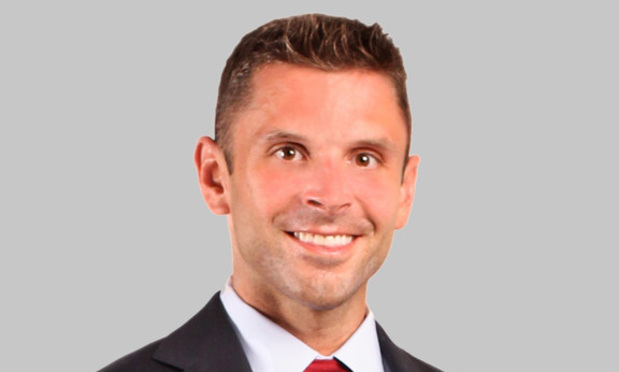Four Recent White-Collar Developments for In-House Counsel
As anticipated, the new administration has spurred a number of changes to the legal landscape, particularly in the white-collar arena.
November 07, 2017 at 01:32 PM
7 minute read
 Benjamin McCoy of Fox Rothschild.
Benjamin McCoy of Fox Rothschild.
As anticipated, the new administration has spurred a number of changes to the legal landscape, particularly in the white-collar arena. Below are four recent white-collar developments that in-house counsel should know about.
Signals of Change to the Corporate Misconduct Policy
It has been more than two years since the Yates memo ushered in an era of increased individual accountability for corporate wrongdoing. While the results of the memo have been mixed, both critics and supporters expected the issue of individual culpability to be among the first issues addressed by the new regime.
While formal guidance has yet to come, most signals indicate the DOJ will continue to prioritize individual accountability. At an Oct. 25, speech to the U.S. Chamber Institute for Legal Reform, Deputy Attorney General Rod Rosenstein reaffirmed the government's commitment to pursuing individual wrongdoers. Rosenstein's comments echoed those from May 2017, in which Rosenstein pledged to prosecute those directly responsible for making the decisions that result in corporate wrongdoing.
At the same time, Rosenstein also acknowledged the need for increased guidance. This is welcome news to in-house counsel who have been left to formulate internal policies based on a memo that leaves a number of issues open for interpretation. Chief among these issues is the mental culpability necessary for individual liability. In particular, when, if ever, do negligence-based actions rise to the level of criminality? In an April 2017 speech, Attorney General Jeffrey Sessions indicated that the DOJ would distinguish between honest mistakes and willful misconduct.
In short, the DOJ remains committed to punishing individuals for corporate wrongdoing, but the particular means and methods by which it will accomplish that goal remain to be seen.
Continuing International Cooperation in Foreign Corrupt Practices Act Investigations
In September, the DOJ and the SEC entered into the largest FCPA settlement to date with Swedish-based Telia Company AB (Telia). The settlement arose from an investigation into payments that Telia made when trying to enter the telecommunications market in Uzbekistan.
The Telia investigation continues the general trend of increased cooperation between foreign authorities, particularly in corruption investigations. The case was opened by Swedish authorities in 2012 before the U.S. and Dutch enforcement authorities entered the fray. The three countries cooperated throughout the investigation, and all three will receive a share of the settlement proceeds. Perhaps even more impressive is the number of additional countries that assisted, including: Austria, Belgium, Cyprus, France, Ireland, the Isle of Man, Latvia, Luxembourg, Norway, Switzerland and the United Kingdom.
The case also exemplifies the DOJ's continued efforts to incentivize cooperation. While Telia did not voluntarily disclose its conduct, it did cooperate throughout the investigation. In addition, Telia implemented a number of remedial efforts, including a complete overhaul of its corporate governance and compliance policies. Consistent with the teachings of the Yates memo, the DOJ also credited Telia with terminating the individual employees responsible for the scheme. Notably, Telia terminated both active wrongdoers and those who had supervisory responsibility. For in-house counsel, the Telia matter reiterates the importance of active supervision in FCPA compliance.
Clarification of District Court's Role in Deferred Prosecution Agreements
Over the past several years, the DOJ has increasingly utilized deferred prosecution agreements (DPAs) to settle corporate investigations. In the typical DPA, the DOJ files a criminal information with the court but defers prosecution. In return, the corporate defendant agrees to fulfill certain conditions (i.e., monetary penalties). Most DPAs are filed in conjunction with a “corporate monitor agreement” that requires the corporation to retain an independent monitor to supervise its compliance with the DPA. To that end, corporate monitors prepare regular reports for the government by reviewing, inter alia, a wealth of confidential internal documentation.
District courts usually have a minimal role in implementing a DPA unless it is breached. However, some district courts—citing their inherent authority and/or the Speedy Trial Act—have exercised a substantive role in monitoring the implementation of DPAs. In United States v. HSBC Bank USA, No. 16-308 (2d Cir. 2017), the district court did just that, purporting to oversee the implementation of a DPA by requiring the government to submit regular reports. In exercising that authority, the district court eventually unsealed a corporate monitor's report. On appeal, the Second Circuit reversed the district court's unsealing order, finding that it was not a “judicial document” subject to the presumption of public access. In so holding, the Second Circuit rejected the notion that a district court has the authority to broadly oversee the implementation of a DPA in the absence of impropriety.
For in-house counsel, the HSBC decision reaffirms the limited role of district courts in the DPA context. More importantly, the decision reassures in-house counsel that any sensitive information turned over to a corporate monitor will not be made public absent exceptional circumstances.
Privilege Issues Implicated by Interactions With Prosecutors
The aforementioned Yates memo bars corporations from receiving cooperation credit unless they disclose “all relevant facts relating to the individuals responsible for the misconduct.” Several commentators have suggested that this provision creates an inherent conflict between corporations and their employees by essentially enlisting corporations as agents of the DOJ. If true, such a requirement would only serve to exacerbate the already-complex privilege issues permeating internal investigations.
The recent California case of IAR Systems Software v. Superior Court of San Mateo County, 218 Cal. Rptr. 3d 852, 854 (Cal. Ct. App. 2017) illustrates the type of privilege issue that can arise from too much cooperation. In IAR Systems, the court was faced with parallel civil and criminal cases against the CEO of IAR. In the criminal case, the CEO filed a motion to determine whether the law firm representing the corporation should be considered part of the prosecution team. If, as the CEO argued, the law firm was part of the prosecution team, then it would be bound by Brady to turn over any and all material and exculpatory evidence. The broad array of evidence falling under Brady could potentially require the disclosure of information otherwise protected by the attorney-client privilege. The trial court found that the law firm was part of the prosecution team because: the law firm forwarded a request from the DA to provide information from a forensic accountant, the DA provided the law firm with criminal citations for use in a deposition, and the law firm provided the DA with pre-existing research on the CEO's ratification defense.
On appeal, the California First District Court of Appeal overruled the trial court, framing the salient inquiry as “whether the prosecution has exercised such a degree of control over the non-governmental actor or witness that the actor or witness's actions should be deemed to be those of the prosecution for purposes of Brady compliance.” In its analysis, the court reasoned that the three interactions cited above did not meet the requisite level of “control” necessary to bring the law firm under the scope of Brady.
While the law firm in IAR Systems was able to avoid Brady, law firms and in-house counsel must remain cognizant of the privilege issues inherent in cooperating with the prosecution.
Benjamin McCoy, an associate at Fox Rothschild, is a trial and appellate litigator. He has a broad commercial practice with an emphasis on international, employment, entertainment, and intellectual property litigation.
This content has been archived. It is available through our partners, LexisNexis® and Bloomberg Law.
To view this content, please continue to their sites.
Not a Lexis Subscriber?
Subscribe Now
Not a Bloomberg Law Subscriber?
Subscribe Now
NOT FOR REPRINT
© 2025 ALM Global, LLC, All Rights Reserved. Request academic re-use from www.copyright.com. All other uses, submit a request to [email protected]. For more information visit Asset & Logo Licensing.
You Might Like
View All
The Support Center for Child Advocates Welcomes New Executive Director


Trending Stories
- 1Florida Bar Sues Miami Attorney for Frivolous Lawsuits
- 2Donald Trump Serves Only De Facto and Not De Jure: A Status That Voids His Acts Usurping the Power of Congress or the Courts
- 3Georgia Hacker Pleads Guilty in SEC X Account Scam That Moved Markets
- 4Trump's Pick for SEC Chair Likely to Stymie Shareholder Proposals from ESG Advocates
- 5Adobe’s Chief Cyber Legal & Privacy Officer Talks Managing Gen AI Risks, Cyber Training
Who Got The Work
J. Brugh Lower of Gibbons has entered an appearance for industrial equipment supplier Devco Corporation in a pending trademark infringement lawsuit. The suit, accusing the defendant of selling knock-off Graco products, was filed Dec. 18 in New Jersey District Court by Rivkin Radler on behalf of Graco Inc. and Graco Minnesota. The case, assigned to U.S. District Judge Zahid N. Quraishi, is 3:24-cv-11294, Graco Inc. et al v. Devco Corporation.
Who Got The Work
Rebecca Maller-Stein and Kent A. Yalowitz of Arnold & Porter Kaye Scholer have entered their appearances for Hanaco Venture Capital and its executives, Lior Prosor and David Frankel, in a pending securities lawsuit. The action, filed on Dec. 24 in New York Southern District Court by Zell, Aron & Co. on behalf of Goldeneye Advisors, accuses the defendants of negligently and fraudulently managing the plaintiff's $1 million investment. The case, assigned to U.S. District Judge Vernon S. Broderick, is 1:24-cv-09918, Goldeneye Advisors, LLC v. Hanaco Venture Capital, Ltd. et al.
Who Got The Work
Attorneys from A&O Shearman has stepped in as defense counsel for Toronto-Dominion Bank and other defendants in a pending securities class action. The suit, filed Dec. 11 in New York Southern District Court by Bleichmar Fonti & Auld, accuses the defendants of concealing the bank's 'pervasive' deficiencies in regards to its compliance with the Bank Secrecy Act and the quality of its anti-money laundering controls. The case, assigned to U.S. District Judge Arun Subramanian, is 1:24-cv-09445, Gonzalez v. The Toronto-Dominion Bank et al.
Who Got The Work
Crown Castle International, a Pennsylvania company providing shared communications infrastructure, has turned to Luke D. Wolf of Gordon Rees Scully Mansukhani to fend off a pending breach-of-contract lawsuit. The court action, filed Nov. 25 in Michigan Eastern District Court by Hooper Hathaway PC on behalf of The Town Residences LLC, accuses Crown Castle of failing to transfer approximately $30,000 in utility payments from T-Mobile in breach of a roof-top lease and assignment agreement. The case, assigned to U.S. District Judge Susan K. Declercq, is 2:24-cv-13131, The Town Residences LLC v. T-Mobile US, Inc. et al.
Who Got The Work
Wilfred P. Coronato and Daniel M. Schwartz of McCarter & English have stepped in as defense counsel to Electrolux Home Products Inc. in a pending product liability lawsuit. The court action, filed Nov. 26 in New York Eastern District Court by Poulos Lopiccolo PC and Nagel Rice LLP on behalf of David Stern, alleges that the defendant's refrigerators’ drawers and shelving repeatedly break and fall apart within months after purchase. The case, assigned to U.S. District Judge Joan M. Azrack, is 2:24-cv-08204, Stern v. Electrolux Home Products, Inc.
Featured Firms
Law Offices of Gary Martin Hays & Associates, P.C.
(470) 294-1674
Law Offices of Mark E. Salomone
(857) 444-6468
Smith & Hassler
(713) 739-1250






